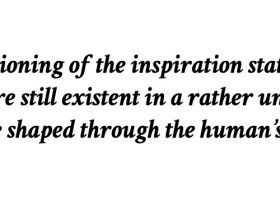[This is the second of three pieces inspired, yet not strictly following, this format. They all attempt to present different criticisms to society as a whole in a more literary, rather than journalistic, style.]
Existentialist. I can’t seem to remember at what point in my early teenage years the term became more appealing than nihilist, or when my soul decided that it comprised my unanswered fears better than anything else. It is ironic how we have reduced existentialism to a fashionable pseudo-intellectual pose for ‘pessimists’, without realizing that it pervades almost every aspect of society, that it has been employed as a creative tool by the system that Sartre and Camus despised the most– why label myself as a member of an intrinsically flawed philosophy? “Existence precedes essence”, that is, we are first and foremost individuals, human beings, no matter what roles or traces we take up, and maybe that is the case of white cis straight males. Yet, as de Beauvoir put it, my female body (and that of people of color, of those identifying as queer) has been historically constructed as a reflection of some ‘standard’ masculine features; its validity has been questioned, continues to be questioned.
If existentialism is humanism, the inseparable link between the physique and behavior should never be ignored, definitely not denied: if from the moment we are born into this body, flaws are stamped as defining, the way in which we shape our actions is inevitably affected. I remember make-up promising confidence, dresses slimness, pills facial brightness; Capitalism has absorbed the Sartrean commandment and rephrased it, exploiting the way we all look, even white cis straight males, to put forward its very own implicature, to tell us that existence (as details of physicality) precedes essence because existence exudes, determines essence. And we have obeyed and accepted it, judging female leaders through wrinkles and hair-dos, black and Asian politicians by their facial expressions, each other by the clothes we wear and the size of our thighs.
“There is no meaning beyond that created by us”, absurdism, probably an over-intellectualized belief that everything is socially constructed, Camus’ path towards equating happiness, or survival, with the enjoyment of the mundane; the luxury of turning one’s back on the bigger picture, the luxury enjoyed by those whose simple existence hasn’t been systematically suppressed. Maybe Sartre’s idealized (and Marxist?) ‘revolutionary working class’ would be able to equally engage in the absurd, but the whole project of such a class is unachievable: under Capitalism, differences within members of the group would lead not only to differences in treatment, but to differences in objectives– in a non-Capitalist system, such a class would not be necessary for, presumably, it is the current structure of the system what it would seek to overthrow. Yet the absurd has trickled down to our view of objects, advertisement projecting meaning– happiness, unity, whatever abstract quality is en vogue– on to beds and cars, perfume and tables, constructing the illusion of a bridge towards experiences, which have, in turn, also been rendered meaningful. The ‘us’ in Camus’ formulation has lost its possible sense of individuality (paradoxically so in these Neo-Liberal times) to become a synonym for what businesses deem to be profitable.
“Existential angst”, the philosophical term for the hyperbolic scenario in which, finding oneself by a cliff, one realizes that one is simultaneously at risk of falling over and of throwing oneself off, the belief in real individual freedom and responsibility in a nutshell; a belief that is prevented by race, gender, sexual orientation and identification, and class (that is, by merely being born as a human being with a background and upbringing), from materializing within everyday existence. “Inauthentic”, existentialists would complain, “that’s what the described form of living is: it implies that choices are random, suggesting that they are the product of the hazardous combination of circumstances and experiences; it implies that we act as we believe we should.” How can an attempt at defending the most basic integrity of human beings so directly place the blame of injustice on its own victims? For, if I assume women have always been free, centuries of domestic violence, of female genital mutilation, of forced marriages, seem to turn from the color of choiceless choices to the shade of individual will. Hasn’t advertisement picked up this obsession with some form of power to decide as opposed to anything similar or reminiscent of determinism? Everywhere I look I seem to be told that finding love is all matter of wearing that perfume, that getting a job is easy when driving that car– yet if I turn around and face the system I know that it will be my gender, my race, my background what marks the difference, not whether I drive into town in a Mercedes while spraying myself with Chanel no.5. “Inauthentic”, existentialists would repeat, “authenticity is the act of creating oneself. In acting guided by Capitalism’s rules, one becomes inauthentic.” But, where does one draw the line? If Capitalism identifies our ambitions in order to exploit them, doesn’t it effectively target our attempts to create ourselves? If this is also inauthentic, how can one know that one’s project of oneself is purely the product of one’s essential intentions and desires? Maybe a Kantian form of introspection is the answer, some individualistically driven isolation.
Existentialism appears to me neoliberal in nature now; perhaps it’s time to break-up with it; perhaps I don’t know enough philosophy; perhaps Nihilism was the answer all around.
[Part I: https://brizomagazine.com/2019/07/22/stream-of-consciousness-i-on-how-we-find-ourselves-complying-with-society
Part III: https://brizomagazine.com/2019/07/22/stream-of-consciousness-iii-on-why-the-grandiose-critique-of-capitalism ]




